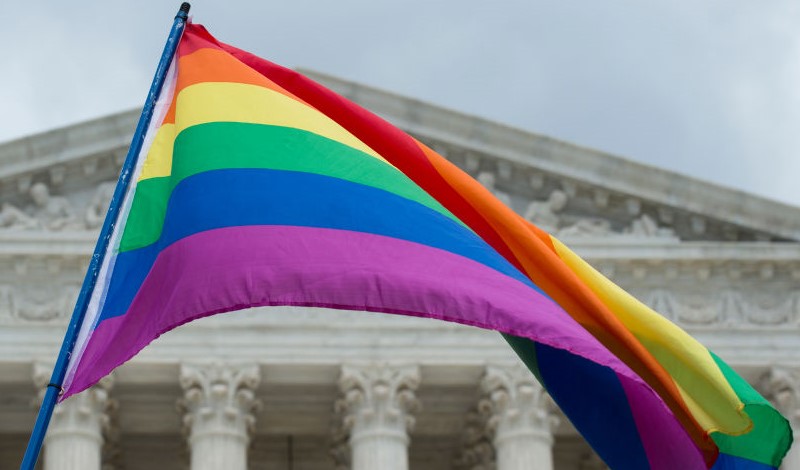
The Supreme Court undercut antidiscrimination law in a case where the key issues were stipulated by the parties, leaving lower courts little guidance in how to apply its ruling.
303 Creative v. Elenis marks the first time the Supreme Court has ever held that the First Amendment grants a business operating in the commercial marketplace a license to violate antidiscrimination laws and tell unwanted customers, “We don’t take your kind here.”
The case involved a Colorado website design company whose owner, Lorie Smith, announced her desire to branch out and start offering wedding websites. Smith said she would refuse to provide this service to gay couples and feared that the state or a private citizen would sue her under Colorado’s antidiscrimination law if that situation ever arose. Smith sued the state, requesting a declaration that Colorado could not apply its antidiscrimination law to her business.
On the last day of June, the U.S. Supreme Court ruled in her favor. The Court invoked stirring language from earlier compelled speech cases that involved private speakers presenting messages to the world as their own and applied those holdings to a business selling goods and services in the public market. The decision marks a turning point in First Amendment doctrine and a new challenge to the enforceability of antidiscrimination laws in commercial transactions. Understanding the scope and application of this doctrine is a matter of pressing importance.
That clarity of understanding, however, remains elusive. When the Court chose to grant review in 303 Creative, it selected an inapt vehicle for launching a major new doctrine. Smith had never actually offered wedding websites for sale when she brought her lawsuit, much less had occasion to turn a real gay couple away. This was not just a pre-enforcement challenge; it was a pre-launch challenge by a plaintiff suing before ever offering the service in question.
A pre-launch challenge of this kind presents a serious practical problem: There are no facts to develop for many of the key questions that will bear on the First Amendment analysis. In place of a factual record, Lorie Smith and the State of Colorado entered into a series of stipulations that took key facts off the table from early in the proceedings. The Supreme Court structured much of its analysis around these hollow stipulations, leaving subsequent courts with little guidance on the scope and applicability of its new and disruptive Speech Clause doctrine.
This essay offers some first steps toward providing that guidance, clarifying the nature of the Court’s ruling and identifying some of the key factual questions that subsequent courts will have to develop when businesses seek to take advantage of this constitutional license to discriminate.
The Supreme Court had two options when deciding how to analyze 303 Creative’s claims. The first was to frame a categorical exemption under which any business that produces goods and services qualifying as “expressive” could invoke the First Amendment to escape the operation of any antidiscrimination law. Given the breadth of the definition the Court uses for “expressive” in this case, such a holding would have constituted a revolution. The Court describes the protected products as those containing “images, words, symbols, and other modes of expression.” If the First Amendment rights at issue were categorical in nature, any business producing goods and services containing words and images could bring itself outside the operation of all antidiscrimination laws. The Court eschewed such a blunderbuss approach.
The second option was to issue an as-applied ruling with a holding structured around the distinctive features of the service 303 Creative provided and the nature of its interactions with its customers. That is what the Court purported to do. But there was a problem: Because the company never actually offered wedding websites, there was no record of facts to develop on these questions. Instead, the company offered a description of the type of service it planned to sell and the terms of service it anticipated requiring its customers to accept, and the State of Colorado agreed to a series of stipulations based on these representations that had the effect of taking these factual issues off the table.
The Court, in turn, crafted its entire holding around these stipulations. At each juncture where the details of the service the company provides and the nature of its dealings with its customers was crucial to its analysis, the Court invoked the parties’ stipulations with a rhetorical flourish and announced that these matters were undisputed and hence easily resolved.
This may sound like a neat trick, but it makes for terrible constitutional adjudication. This was not a case in which the parties developed a full discovery record and then agreed to stipulate to key factual findings that the record clearly supported. Rather, this was a case in which the parties agreed not to develop a factual record on those key questions at all.
This kind of preemptive use of stipulation has legitimate litigation purposes but it makes a case a poor vehicle for the issuance of a major ruling on a new constitutional doctrine. When the holding of the Supreme Court depends on nuanced questions about the nature of the service offered by a business and the nature of its dealings with customers, it is crucial to give lower courts clear guidance on the types of factual record that will qualify a business to invoke this new doctrine. Stipulations based on prediction and air do not provide that guidance.
Consider two key factual questions underpinning the Court’s holding that were undeveloped in this case.
Whose speech counts? 303 Creative claimed that the websites it plans to sell will constitute the company’s own speech because of the nature of the negotiations and collaboration it will engage in with its customers. In essence, the company claimed that it would not make a wedding website for any customer unless that website was consistent with Lorie Smith’s personal beliefs and contained some portion of Smith’s own chosen message. The Court accepted this assertion based entirely on the parties’ stipulations and made it a cornerstone of its new doctrine: “The wedding websites Ms. Smith seeks to create involve her speech. Again, the parties’ stipulations lead the way to that conclusion. As the parties have described it, Ms. Smith intends to ‘vet’ each prospective project to determine whether it is one she is willing to endorse.”
These assertions provoke skepticism. There are not many businesses that tell customers part of what they are paying for is the privilege of promoting the business owner’s own ideological message. Is it really the case that 303 Creative will impose that demand on all its customers when it actually starts offering wedding websites for sale? We cannot know.
More important, we have no guidance concerning what it would actually look like for a company to impose that requirement and to do so consistently. If a company insists on this kind of editorial control only with some unwanted customers but not others—if 303 Creative demands that the websites it produces constitute its own speech only with respect to same-sex couples, for example, and does not impose any such requirement on opposite-sex couples—that selective application would raise doubts as to whether the product the company sells really does constitute the company’s own speech, making the applicability of this new First Amendment doctrine less clear. What kind of factual record would support a finding that a business does in fact make this type of demand of all its customers? On this key question, the Court simply points to a series of stipulations and proclaims the issue resolved.
What counts as an “expressive” good or service? The Court finds that 303 Creative qualifies for an exemption because the product it sells is “expressive.” What does that term mean in this context? Does any business now have a right to discriminate against any unwanted customer when it sells goods and services containing “images, words, symbols, and other modes of expression?” Probably not. The Court bases its holding on the assumption that 303 Creative’s wedding websites will not just contain words and symbols but will be “customized and tailored expressive speech.” Once again relying entirely on the stipulations of the parties, the Court emphasizes that 303 Creative has a license to discriminate because of the “original, customized” nature of the “creations” it plans to sell.
But how “customized” and “original” must commercial goods be to enjoy this license to discriminate? As Justice Kagan pointed out during oral argument, it is easy to imagine a website designer putting most of her artistry into creating an attractive set of templates that allow customers to select from a menu of options and insert their specific information. If that were true, artistry would go into designing the overall product but the “customization” for each client might be minimal and formulaic. Would that product qualify for a constitutional exemption? We do not know. Once again, the Court simply assumes the conclusion based on the parties’ stipulations and provides no guidance on the degree of customization necessary for a product containing “images, words, symbols, and other modes of expression” to support a license to discriminate.
Courts and commentators have a lot of work to do in determining how the new constitutional doctrine announced in 303 Creative will apply in disputes involving actual goods and services sold to actual customers. What follows is a first pass at some guidance for courts in framing factual disputes and developing the record on which these claims now depend.
One pivotal set of questions will involve the nature of the negotiations and collaboration a business undertakes with its customers. 303 Creative does not frame a categorical license to discriminate for businesses that produce goods and services containing images and words; it authorizes discrimination only by companies that require the goods and services they sell customers to remain the company’s own speech. Courts analyzing claims under this new doctrine should begin by placing several questions front and center. What editorial control does the business insist on retaining in the goods and services it sells to customers? Does the business demand that editorial control consistently, or only when certain types of unwanted customers enter the store?
As is true with many aspects of discrimination claims, these questions will be factually complex. Courts will need to scrutinize the contracts and terms of service businesses use and permit discovery on the actual practices businesses employ when working with different types of customers. Does a business make clear on its website or in its advertising, for example, that customers are paying for the privilege of promoting the business’s own ideological views? 303 Creative included some language to that effect on its website, but there was no record of the company actually carrying that demand into practice with the wedding websites it contemplated. Courts in subsequent disputes will need to scrutinize these issues carefully.
Other questions will center on the extent to which businesses create custom goods and services incorporating expression designed and tailored specifically for each customer. In disputes involving real transactions, the answer to those questions will often be contested. If a baker creates beautiful cakes by hand but does the same design work on every cake from a menu of choices and simply includes different text on the cake for different types of clients, does that constitute the kind of “custom expressive product” that would support a license to discriminate? If a dressmaker or tailor creates beautiful clothes and then fits them to each customer’s body, is that “tailoring” part of the custom artistry of the clothes or simply a routine adjustment to a pre-made product? The 303 Creative doctrine does not apply to all products that includes words, images and symbols but only those the business custom-designs for its clients. Courts will have to investigate how much client-specific customization businesses provide when designing and producing the goods and services they sell.
303 Creative opens a major new area of First Amendment contestation. Some business owners will celebrate the ability to turn away unwanted customers and vindicate what they view as their expressive and religious prerogatives. In doing so, they threaten to make the commercial marketplace a more hostile and less predictable place. It now falls to state and lower federal courts to cabin this new doctrine within appropriate bounds by providing the specific factual guidance the Supreme Court sidestepped.
This essay is a part of a nine-part series entitled The Supreme Court’s 2022-2023 Regulatory Term.




